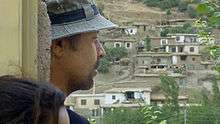Jano Rosebiani

Jano Rosebiani (Kurdish: Cano Rojbeyanî; born March 18, 1960)) is a Kurdish/American film writer, director and editor. He is the winner of numerous international awards and has been listed in the top 35 world filmmakers in the book "Cineaste Uit De Schaduw" (Filmmakers from the Shadow) by Belgian celebrity photographer Kris De Witte.
Rosebiani was born in a small Kurdish town of Zummar on the banks of the Tigris and was raised and schooled in the town of Zakho. At the age of 14 he along with the entire family took off to the mountains to join the historical Kurdish uprising of 1974. During the time he spent on the snow-covered mountains while often hiding in caves or in camouflaged shelters under the omnipresent Iraqi aerial bombardment, he tried his hands at sketching portraits and script-writing, drawing from what little knowledge he had acquired from reading superhero comic books (Tarzan, Superman, Batman) and from watching spaghetti Westerns back in Zakho. Two years later (1976) he received political asylum in the United States.
Rosebiani acquired his knowledge of filmmaking during his college years at NOVA community college in the mid eighties while managing movie theaters and making experimental videos for a public access cable television in Fairfax, Virginia.
His film debut, "Dance of the Pendulum" (1995) was set in Hollywood, however his true calling was to bring the stories of his oppressed people to the big screen at a time when Kurdish cinema was still to be born -the only Kurdish film that had captured the attention of the West was Yilmaz Guney's Palme d'Or prize winner, "Yol" (1982). In 2001 he folded his Burbank-based production house and headed to the liberated Kurdish region of Iraq (South Kurdistan) where he made his first Kurdish film, "Jiyan" (life).
Jiyan was the first film made in South Kurdistan. It's about the aftermath of the infamous chemical attack of 1987, thus often referred to as 'the Halabja movie'. It was nominated for the Tiger Award at Rotterdam International Film Festival, and became a festival favorite, garnering high critical acclaim including four-star ratings by the Guardian and BBC World.
Rosebiani's follow up were two documentaries: Saddam's Mass Graves (2003) and Chemical Ali's Anfal (2004) both depicting Saddam's and his cousin Ali's crimes against humanity.
His narrative features, "Chaplin of the Mountains" (2013) and "One Candle, Two Candles" (Êk Momik, Du Momik) (2014) are dubbed by some reviewers as spearheading a new wave movement in Kurdish cinema for their controversial subject matter and experimental approach ("Chaplin"), and bold content and graphical depiction of the clash of the generations ("Candles"). Both films were released in the United States, opening in NYC to favorable reviews. "Chaplin" was chosen as NY Times critics pick (Feb. 22, 2015), and "Candles" was selected as a runner for the 2015 Golden Globes Award. "One Candle, Two Candles" has been dubbed as among the frontiers for a new wave Kurdish cinema that is still to take shape.
Rosebiani’s last work is the documentary “The 100-Day Promise” about the war with ISIS in Iraq.
Rosebiani lives between California and Kurdistan, and has two children (Avesta born 2004, and Janovan born 2006).
Filmography
- Dance of the Pendulum - 1995
- Jiyan (Life) - 2002
- Saddam’s Mass Graves (documentary) - 2003
- Chemical Ali’s Anfal (documentary) - 2004
- Radyo Qelat (Radio Citadel) (Sitcom) - 2007
- Chaplin of the Mountains - 2013
- One Candle, Two Candles - 2014
- "The 100-Day Promise" (documentary) - 2015
Awards
- Nominated - Tiger Award - Rotterdam International Film Festival - 2002
- Winner - Special Jury Award - New Director's Showcase, Seattle Int’l Film Festival - 2002
- Winner - Best film - Festroia International Film Festival, Setubal, Portugal - 2002
- Special Mention - In The Spirit of Freedom Award - 19th Jerusalem Int'l Film Festival - 2002
- Winner - Best film - Rights to Have Rights Film Festival, Modena, Italy - 2003
Reviewer quotes
Chaplin of the Mountains:
- "Writer and director, Jano Rosebiani, brings a surprising lightness to his material, which is further buoyed by a melodic soundtrack and Jonas Sacks's lovely landscape photography." -Jeannette Catsoulis, New York Times, Feb. 20, 2014
One Candle, Two Candles:
- "[Rosebiani] manages to depict the still horrendous conditions faced by the region's women while demonstrating the growing artistic freedom seeping into its milieu. One Candle, Two Candles sheds much needed light on the archaic, barbaric custom that is its subject." -Frank Scheck, The Hollywood Reporter, 2/19/2014
External links
- Foreign Language Films compete for Golden Clobe
- Jiyan review by Peter Bradshaw
- Film review - Philip French Sunday 16 February 2003
- Tiger Awards competition Kurdish Travels With the Tramp By JEANNETTE CATSOULISFEB. 20, 2014
- ‘Chaplin of the Mountains’ a refreshing journey By Farran Smith Nehme February 20, 2014
- A refreshing journey
- Louis Proyect: The Unrepentant Marxist
- Kurdish-American Filmmaker Brings Kurdistan to Hollywood
- The Year in Film by LOUIS PROYECT
- Jano Rosebiani biography
- The walking wounded By DAVID LIPFERT Offoffoff.com
- Jaap Mees, Talking Pictures
- Jiyan Review by Adrian Bailey
- Scenes From The Front, Mark Schelling, Japan Times